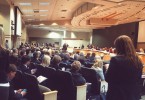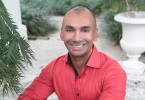Deeply religious even from an early age, Bishop Makalani-MaHee fought internal demons that have directed his life and defined his career. Born into a Pentecostal family in the Bronx, Makalani-MaHee struggled with his gender identity for as long as he can remember. When he was unable to find easy answers within the religion that had been taught to him, he created his own internal guidance system based on a higher power centered on love.
Today, Makalani-MaHee is the transgender program coordinator for the Florida Department of Health in Broward County. With many challenges facing the trans community, trans women of color are especially left at a disadvantage. Saturday evening, 25-year-old Maya Young was brutally stabbed to death in Philadelphia, making her the latest causality of an epidemic of violence against this marginalized community.
One of our ‘Movers and Shakers’ profiled in last year’s inaugural round-up of Florida’s 100 brightest LGBT community members, we had the opportunity to dive deeper with Makalani-MaHee. We discussed his passion, black history, his transition, and the daunting obstacles faced by trans women of color.
KACALA: What drives your passion forward?
Makalani-MaHee: My passion here in the community, specifically as it pertains to the transgender community is very simply around making sure the ‘T’ in ‘LGBT’ is no longer invisible in our community. That not only the ‘T’ is not invisible but that we have a safer community for transgender people to navigate and move freely through.
KACALA: Tell our readers about the work you do with the trans community here in Broward County.
Makalani-MaHee: One of the things that I am charged with doing in my capacity as the transgender program coordinator for the Florida Department of Health in Broward County is of course making sure we reduce the incidence of HIV infection and STI infection.
My primary responsibility is to provide HIV education, risk reduction and linkage to trans woman who are at risk as well as making sure we are really addressing the social stigma that puts people at risk. It’s not just about talking about HIV infection, STIs and getting people linked to PrEP. It’s also about making sure they have employment, that they are linked into medical care, linked into mental health care. We are taking a holistic approach to making sure the whole person is being treated and affirmed when it comes to the transgender community here in Broward County.
KACALA: What are the obstacles trans men and women of color have to overcome in this community?
Makalani-MaHee: Employment, specifically when you talk about trans woman of color. They face discrimination when it comes to employment. It makes it difficult for you to be able to support yourself, to maintain housing much less actual valid health care as opposed to black market hormones. So if you have no employment, which leads to no housing, no medical insurance to link you into medical care than your options are very limited and a lot of these women are faced with doing survival sex work. Then that raises your incidence for not only HIV but STIs as well. So, it’s not just about employment. It’s about employment being a gateway to having a balanced, meaningful life.
KACALA: Tell me about your journey transitioning.
Makalani-MaHee: I spent over 25 years as an activist in the community and was very public as a radical activist and organizer. People were already familiar with me. I think that on a community level people had to adjust because they had this way of relating to me as a woman for 25 plus years. But I’m also glad the community was able to struggle with that adjustment. I was extremely blessed with community support. There was such an out pouring of support emotionally and even financially. That I know most people do not receive. I recognize that was extremely blessed to receive.
When it comes to my immediate family, coming to terms with my gender transition we are still trying to navigate. I haven’t spoken to my mother since the day I tried to tell her about my decision to transition. I understand why a lot of people are hesitant to be their authentic self to come out as trans. In this society, where it is estimated that less than 8% of the population know someone who is trans, we are still portrayed as freaks, we are still perceived as people who want to mess with “God’s creation” and messing with our gender. It is not perceived as us stepping into our authentic self’s.
I get that for some the thought of stepping into a community that is so unbelievably stigmatized is very scary. And the losses can be extremely real. Especially for trans women of color who face not only sexism but discrimination of employment that trans men do not experience. Because we are able to live “stealth.” We get to a point where do we do need to disclose we are trans. The costs for trans women are extremely different and those issues are compounded when we talk about trans women of color.
But I can honestly say, there is nothing I would do differently of the quality of life that I have now – I would not trade no matter the cost. If my family ends up being more supportive – wonderful. If my mother and I somehow reestablishing our relationship, wonderful. But if we do not. I know have sister and brothers that I didn’t have before. I now have people in my life who support unconditionally. Those gains ease the pains of the losses.
KACALA: Where does your deep seeded spirituality come from?
Makalani-MaHee: It is one the greatest gifts my mother ever gave me. The love of God. I was born and raised in a black Pentecostal church. That relationship and core has definitely been the sustaining force in my life.
KACALA: What does Black History mean to you?
Makalani-MaHee: You know, the first thing that comes up for me around Black History Month is in the midst of all the challenges we continue to face in this society, especially around the Black Lives Matter campaign – the struggles around race in this country still challenged us. What Black History Month reminds me for us to take an opportunity to remember we come from strong stock. That we come from people who weren’t supposed to make it – who not only made it – but we didn’t just survive we thrived. I think that is a message trans folk and the LGBT community in general can take away. We don’t die. We multiply. We can absolutely change the narrative of our oppression







